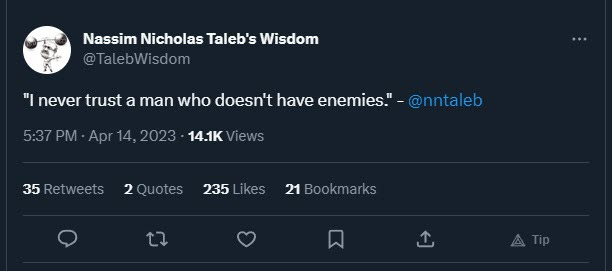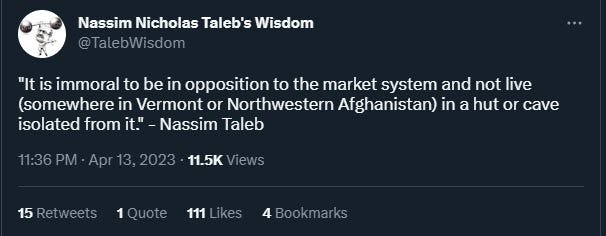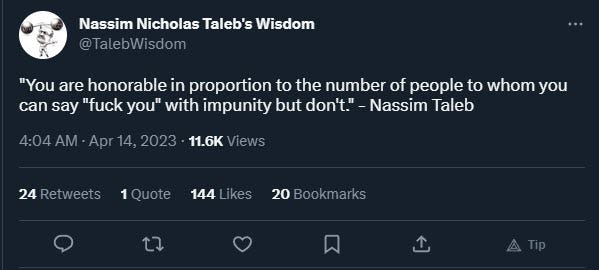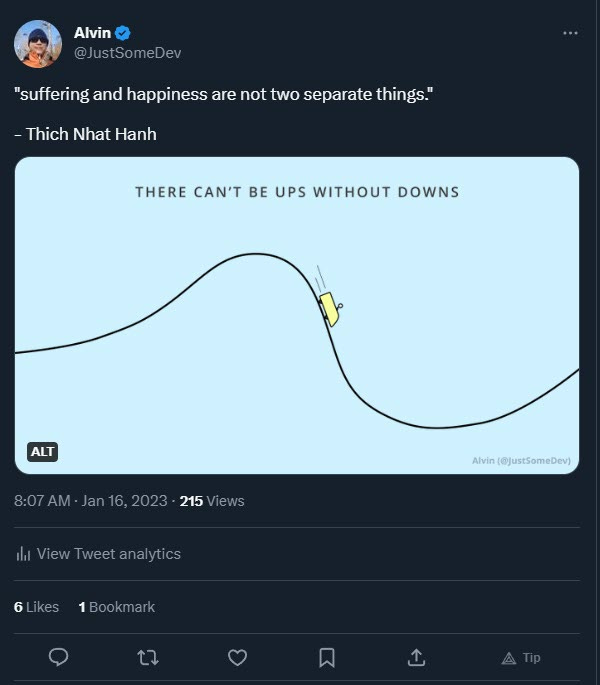Dive 34: 50 percent of people won’t read past this title… and why that will cost them
Hey, it’s Alvin!
Did the title catch your attention?
No, it’s not clickbait. I will explain what I mean.
But first, some context…
During my mid-20s, not long after I graduated from university, I had some struggles in life. One of my biggest struggles was that I had a hard time dealing with uncertainty. My fear of uncertainty made me extremely risk averse, which held me back in terms of personal growth.
But I was a bookworm. And someone I knew thought the works of one particular author was brilliant:
Nassim Nicholas Taleb.
So, I bought one of his books, Antifragile. Let’s just say I fell in love with Taleb’s books and ideas. Taleb’s approach to uncertainty is a far cry from the risk management approaches typically sold by academia. He’s more a purveyor of learning how to take risks to avoid ruin, and grow from them. It’s about moving away from fragility, beyond robustness, to become “antifragile.”
Taleb has several other books, each exploring some aspect of dealing with uncertainty. Collectively, they changed my perspective and approach to uncertainty in life. For the first time in my life, I had (and still have) confidence approaching uncertainty in ways I never could before. I explored this more in Dive 24: Why you need to start BEFORE you feel ready.
Because of that, I was excited to discover that Nassim Taleb is on Twitter.
I also discovered a few other accounts that tweet quotes from Taleb.
Look at this beauty:
Or this one:
Or this one:
But here’s the thing…
If you haven’t read Taleb, it’s hard to get the deeper meaning behind these messages.
For example, some people interpreted that last one to be a message of kindness. I’d say it’s more about the relationship between honor and the number of people you can piss off if you wanted to.
It’s just impossible to condense the depth and breadth of ideas explored in entire books into 280 characters. I know there are Twitter threads, TwitLongers, and now, Twitter blue users can post longer tweets. But all those options still only scratch the surface of ideas. And despite them, most users still stick to the tweet character limit because that’s just what makes Twitter, Twitter.
Still don’t believe me?
Take this tweet of mine:
I’m sure everyone gets this on some level.
But there’s also an entire story behind this idea. It’s a story that follows the adventures of a man enduring harsh Canadian winters to discover joys hidden within. It’s a story that explores a human experience that gives a seemingly ordinary idea, and visual, meaning you can’t get otherwise. You can read more about it in Dive 17: The Joy in Pain.
The richness and beauty of life just can’t be condensed beyond a certain point. I’m not trying to toot my own horn. The reality is there’s not a single tweet with a Taleb quote that would’ve inspired me. Not even the three I shared above.
And there’s not one tweet that EVER changed my life.
Certainly not for the better.
It took time to explore ideas in entire books for me to begin making sense of the intricacies of uncertainty. Social media, however, is all about micro-content.
Despite that, people are spending more time than ever on social media. And that makes sense because all the major social media platforms of today are all designed to capture and retain your attention. As are all the most popular videos, blog posts, and news articles these days.
I know because I’ve taken a few writing courses in recent years. Every one of them had a module that taught us how to make catchy titles and headlines. Why? Because 50% to 80% of people do not read past the headline. In fact, I bet you know someone who likes to share news articles because they got angry with the headlines. But then, when you read it, you found the headline didn’t accurately reflect the content.
But even when the headline accurately portrays what’s in the article’s body, it can (and will) never capture all the rich details within. Just as a book title can’t capture the depth and breadth of stories within. Just as a tweet can’t capture the complex ideas beyond it.
So, when we just read a headline, title, or tweet without further examining the underlying ideas they represent, we do ourselves a disservice.
We’re missing out.
When we spend the bulk of our time skimming 280-character tweets, 30-second TikToks, and 10-word titles we might gain likes, replies and followers that give us fleeting feelings of satisfaction. But, in the long run…
We lose.
We lose out on meaningful stories that change how we see the world.
We lose out on opportunities to connect with one another on a deeper, human level.
We lose out on paradigm shifting ideas that change our lives for the better in ways we can’t imagine.
THESE are the costs of failing to read past the title.
See?
I promised that the title of this Dive is not clickbait. Because it’s true.
By reading this far, you either gained knowledge or were reminded of an important life lesson. YOU got something out of this that title skimmers did not get. That is a cost to them, but not to you.
And there’s more.
In next week’s Dive, I will share with you a critical life skill I learned that will allow you to get more out of anything you read for a richer life. It’s a skill that allows the most brilliant people in the world to think critically without being swayed by silly headlines and catchy clickbait.
I hope you enjoyed this dive Below the Surface of catchy titles. Reply to belowthesurfacetop@gmail.com if you have questions or comments. I’d love to hear from you.
Thank you for reading all the way through. I really appreciate it. Have a wonderful day. And I’ll see you in the next one.






